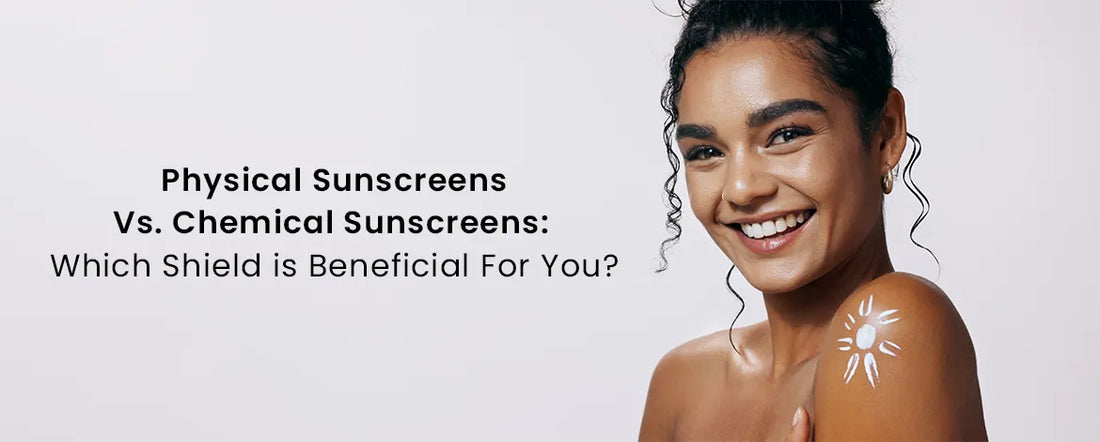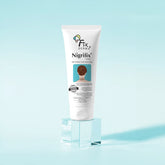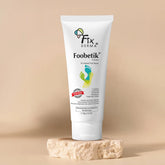Physical Sunscreens vs. Chemical Sunscreens: Which Shield is Beneficial for You?

Tables of Content
- Physical Sunscreens and Their Impact
- Key ingredients used in Physical Sunscreens
- Role of SPF in Physical/Mineral Sunscreens
- Advantages of Physical Sunscreens
- Chemical Sunscreens and Their Impact
- Key ingredients used in Chemical sunscreens
- Advantages of Chemical Sunscreens
- Which Sunscreen to Choose?
- Conclusion
- Frequently Asked Questions (FAQs)
Picking up the correct sunscreen is crucial in getting glass-like skin. There are tons of options available in the market but selecting the right one based on your skin type and concern makes a huge impact. Both physical and chemical sunscreens aim to protect the skin and offer complete sun protection but the difference arises when we compare them in terms of their mechanism, ingredients, and their impact of effect on the skin. In this blog we will delve into the details of physical and chemical sunscreens and and on top of that, we will also delve into which could be an ideal sunscreen for your skin type.
Physical Sunscreens and Their Impact
The other class of sunscreens are called physical sunscreens, and they are sometimes referred to as mineral sunscreens. Active minerals for the physical sunscreens include zinc oxide and titanium dioxide. These minerals are the key, as they are adept at their work: they don't absorb into your skin, and create a physical barrier sitting on top of your skin that optimal blocks out the sun's UVA and UVB rays. When you apply a cosmetic cream, gel, or spray to block UV radiation, a thin layer of the outer layer of the skin serves as a sophisticated sunscreen before the UV radiation reaches the skin.
Key ingredients used in Physical Sunscreens

- Zinc oxide: It gives major protection to the skin, providing broad-spectrum protection for both UVA and UVB rays. These are suitable for sensitive skin also.
- Titanium Dioxide: It is an inert earth mineral that protects skin from UVA and UVB radiation and is considered no risk of skin sensitivity. Because it’s gentle, titanium dioxide is a great sunscreen active for sensitive, redness-prone skin. It’s great for use around the eyes, as it is highly unlikely to cause any irritation to the skin.
Product Recommendations
Fixderma Shadow A gel is a transparent, non-oily sunscreen for acne-prone skin. Its non-comedogenic formulation prevents acne flare-ups while protecting the skin from sun damage.
Shadow Silicone Matte Cream SPF 50 is a non-greasy sunscreen that protects the skin from various harmful radiations including UVA, UVB, Blue Light, Infra-Red Light, and High Energy Visible Light.
Shadow SPF 30+ Lotion helps protect the child's delicate skin against harsh UV rays. Zinc oxide, Sun Cat, Niacinamide and Vitamin E help form a protective barrier on the child's skin. Skin stays moisturized, smooth, and safe from the sun.
Shadow Sunscreen Stick SPF 50 formula is designed for active individuals who demand uncompromising sun protection for long hours of sun exposure. Being portable and handy, this high-performance sunscreen stick is water and sweat-resistant, making it the ideal companion for sports and outdoor adventures.
Role of SPF in Physical/Mineral Sunscreens
Physical sunscreens typically offer SPF protection ranging from 30 to 50. SPF indicates the sunscreen's effectiveness in blocking UVB rays. An SPF 30 sunscreen can block around 97% of UVB rays, while an SPF 50provides slightly higher protection, blocking up to 98% of UVB rays.

Advantages of Physical Sunscreens
- Ideal for Sensitive Skin: Less absorbed by skin so chances of getting irritation or allergy is very minimal.
- Immediate Protection: Physical sunscreens show their work immediately the moment they are applied to the skin.
- Perfect for Daily Use: These are non-comedogenic i.e., they don’t clog pores, so they become a great solution for daily use
- Reef-Safe: It is environment-friendly as no harm has been caused by the ingredients of physical sunscreen to marine life.
- Long Lasting: Offers even coverage and long-lasting protection from the sun.
Chemical Sunscreens and Their Impact
Chemical sunscreens work differently from mineral sunscreens. Instead of blocking UV rays, they absorb them and convert the rays into heat, which is then released from the skin. These sunscreens typically contain ingredients like oxybenzone, avobenzone, octisalate, and octocrylene.
Product Recommendations
Shadow SPF 30+ Gel is a dermatologist-recommended sunscreen that is specifically formulated for oily and acne-prone skin. It has a lightweight and non-greasy formula that absorbs easily into the skin without leaving any sticky or oily residue. This makes it ideal for those with oily skin because it won't exacerbate their skin oil.
Fixderma Shadow SPF 50+ Gel is a gel-based sunscreen specially designed for sensitive, acne-prone skin. The lightweight and non-greasy formulation is packed with the most photostable sun-protecting agents, making it perfect for all-season sun protection. This oil-free formulation provides long-lasting broad-spectrum UV protection and leaves no white cast.

Key ingredients used in Chemical sunscreens
- Avobenzone: Mainly offers protection against UVA rays
- Oxybenzone: Absorbs UVB and some UVA rays but it has a trait of causing skin irritation.
- Octocrylene: Mainly stabilizes avobenzone but it also contributes to skin irritation.
Role of SPF
Physical sunscreens typically offer SPF protection ranging from 30 to 50+. These sunscreens need to be applied on the face 20 minutes before sun exposure for maximum benefit.

Advantages of Chemical Sunscreens
- Lightweight and very Comfortable: These sunscreens are lightweight and blend in very effortlessly into the skin leaving no white patches or cast behind making it an ideal option for long-lasting sun protection.
- Requires Less Product: Chemical sunscreens get easily absorbed into the skin. So, for further skin protection, less amount of cosmetic products are needed.
- Water and Sweat Proof: Many chemical sunscreens perform well when they come in contact with water or sweat. This type of sunscreen is best suited for sports person or outdoor activities.
Comparison Between Physical and Chemical Sunscreens
- Physical sunscreens generally leave a white cast on the skin and it may look bad on people with dark skin tones.
- Physical/mineral sunscreens can give a feel of heaviness or greasy which may be uncomfortable.
- As the sunscreen sits on the skin it can be easily rubbed off by water or sweat.
- Some ingredients of chemical sunscreen can cause skin irritation which may be accompanied by redness, itching, etc.
- Many of the sunscreens are not environmentally friendly and they mainly cause harm to the reef life.
Which Sunscreen to Choose?
Ideal Sunscreen for Daily Usage: For daily dosage, the best sunscreen would be a chemical one as it easily blends with the skin without leaving and white patch or mark moreover these are lightweight and easy to apply.
Reef-Safe Sunscreen: Choosing an environmentally friendly sunscreen is also quite important to preserve our coral lives especially. So choosing physical sunscreen would be a hit in this case as it is eco-friendly and reef-safe as well.
Shadow SPF 50+ Cream is a lightweight cream-based sunscreen that provides excellent UV rays coverage for a longer duration. This photostable sunscreen is ideal for all weathers and suits all skin types including dry and sensitive skin.
Conclusion: Choosing between physical and chemical sunscreen entirely depends on your skin type, lifestyle, and other factors. For people with sensitive skin and good protection, it is advisable to go with physical sunscreens. However, if you prefer lightweight and water-resistant sunscreen then we would recommend you a chemical one.
Frequently Asked Questions (FAQs)
Physical sunscreen is best for sensitive skin as it has ingredients like zinc oxide and titanium oxide which protect the skin from UV rays, without irritating the skin.
Yes, you can use chemical sunscreen for oily or acne-prone skin but ensure it is non-comedogenic. Chemical sunscreens do not clog pores and are lightweight and if you want to use physical sunscreen then make sure it gives a matte finish as it helps to control oil production.
Both chemical and physical sunscreens have their own pros and cons. Depending upon the skin type and skin need, you can choose the type of sunscreen you want. Just make sure that the sunscreen you choose should be non-comedogenic, non-irritating, and leave no white cast. Fixderma Shadow Sunscreens meet all such requirements and are suitable for sensitive skin without irritating the skin.








